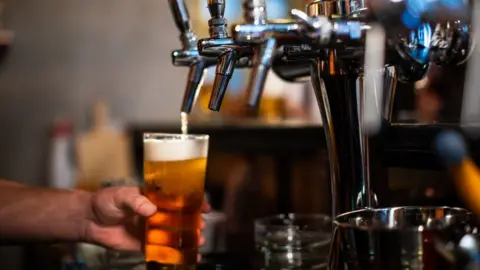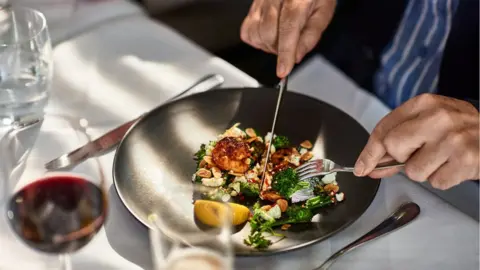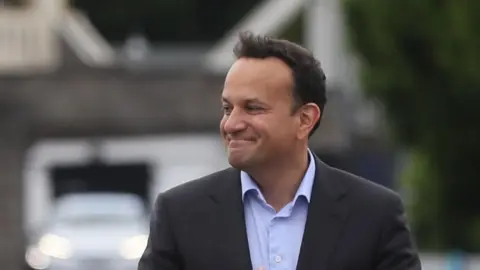Covid-19: Irish hospitality restrictions come into force
 Getty Images
Getty ImagesTighter restrictions aimed at curbing the spread of the Omicron variant have come into force in the Republic of Ireland.
From Monday, hospitality and cultural venues including pubs, restaurants, cinemas and theatres must close by 20:00.
The measures will stay in place until at least 30 January.
Ireland's chief medical officer Dr Tony Holohan said the measures are critical to protecting public health.
Speaking on RTÉ's Morning Ireland, he said the restrictions will "help to cut" social contact and virus transmission.
He said the measures need the public to be "both understanding and buying in not just the letter but the spirit of what these guidelines mean".
"Of course at Christmas time family, friends and close friends are important to us and we need to each confine our engagements as much as possible to those small groups of people, and that we don't meet up with multiple groups of people over the time period of Christmas".
Dr Holohan said if the public comply with the new restrictions "we believe we can have a significant impact on the transmission of this virus".
Over the weekend, he said that the Omicron variant is now the dominant Covid-19 variant in the Republic of Ireland.

'We'll manage for a couple of weeks'
 Getty Images/10'000 Hours
Getty Images/10'000 HoursCarol Meenan owns a restaurant in Lettekernny in County Donegal.
She told BBC Radio Foyle she is "really upset" by the latest restrictions on hospitality.
"I could make the analogy that it's a bit like going to a really big football match at the end of the season and everybody's is really excited and then you are told you have to go home at half time."
She's planning on opening the restaurant earlier to counter the closing time rules. But she fears that may not be enough.
There's now caution among the public about socialising, she said, and there was a rise in cancellations and no-shows over the weekend.
"Timewise I think we will be able to manage for the next couple of weeks," she said.
"But in January, if it was this type of business I cannot see that being sustainable, there isn't the trade for me at lunchtime - that went with the recession."

In a televised address on Friday, Taoiseach (Prime Minister) Micheal Martin said the Omicron variant represented a "significant threat" with more than a third of new cases in the country being due to the new variant.
Tánaiste (Irish deputy PM) Leo Varadkar warned on Monday that record case numbers of the Omicron Covid-19 variant are expected.
"This is a much more transmissible strain of the virus, we will see very high case numbers but we are hoping and expecting that it wont translate into hospitalisations, ICU admissions and deaths to the extent it did in previous wanes," he said.
Another 5,124 cases of coronavirus were reported in the Republic of Ireland on Sunday. There were 436 patients with Covid-19 in hospitals with 107 people being treated in intensive care units.
 Brian Lawless/PA Wire
Brian Lawless/PA WireFurther measures to come into force in Ireland on Monday include:
- Number of spectators allowed to attend sporting events to be capped at 50% capacity, up to a maximum of 5,000 people
- All indoor events can operate at 1,000 or 50% capacity and must be fully seated
- Weddings will have a cut-off time of midnight and an attendance cap of 100
Earlier this month, the Irish government introduced measures that were expected to last until 9 January.
These included the closure of nightclubs, attendance limits on concerts and sporting fixtures and tighter restrictions on the hospitality sector.
